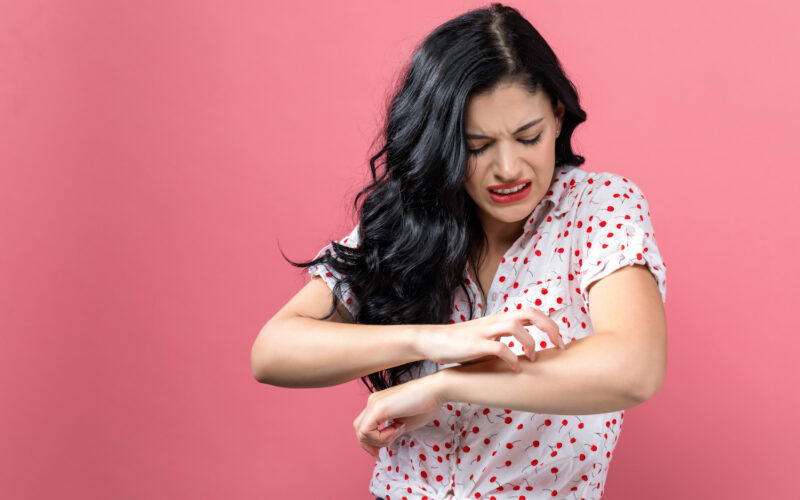Summertime and the living is … itchy. Bugs are biting, and the poison ivy is high. And whether you’re enjoying the beach or the backyard, you’re likely to encounter something that leaves you with bothersome red bumps.
Before you head outside, check out this guide to summer skin conditions so you can avoid ruining a lovely summer day. And remember: Sunburn can make skin ailments worse — not to mention increase your risk of cancer — so slap on that SPF30 broad-spectrum sunscreen every day before heading outside
Heat Rash (“Prickly Heat”)
This rash, caused by blocked sweat glands, shows up in areas prone to chafing during hot, sticky weather — like your thighs or the folds of your skin. If you’re planning to play or exercise outdoors, wear lightweight, loose clothing in fabrics that let your skin breathe. Also steer clear of heavy body lotions or powders, which clog your pores and make you more susceptible to heat rash. If you feel dizzy or nauseated after being out in the sun, call your doctor right away — this may signal heat exhaustion.
Insect Bites
Flies, mosquitoes, fire ants and other creepy-crawlies can leave you with itchy, raised red welts. Your best defense: Use an insect repellent that contains DEET, especially at dusk and dawn. After parties and backyard swims, dump the water from your wading pool, ice cooler and other containers, since mosquitoes breed in stagnant waters. And if you notice a red, bull’s-eye-type ring around a mosquito bite, see your doctor — this can be a sign of Lyme disease.
Rashes From Poisonous Plants
Have you ever noticed patches of red bumps and weeping blisters on your skin after a hike or an afternoon in the garden? Then you know there are few skin ailments more irritating than that caused by the oil on poison ivy, poison oak or poison sumac. You can even develop the rash just by touching a gardening tool or a pet that has rubbed up against one of the plants.
Learn to recognize the poisonous plants in your area, and ask your dermatologist about over-the-counter “ivy block” lotions. Also wear long pants and long-sleeve shirts during outdoor walks, and then wash them in hot water when you’re done. Gardening? Use disposable gloves — or wash them afterward, every time — and clean your tools with rubbing alcohol. If you’ve been exposed, you can lower the chances of a rash if you wash the affected skin with soap and water within 30 minutes. See your doctor if the rash forms around your eyes, mouth or genitals, or if it causes pain or swelling.
Sun Allergies
Have you ever noticed your skin flush or break out in tiny bumps or hives within minutes of being in the sun? Then you may have sun sensitivity, a condition that can either be inherited or provoked by certain medications, including antibiotics and ibuprofen.
If you’re sun-sensitive, you need to take special precautions outdoors. Apply sunscreen every two hours. Wear sunglasses, a hat and long shirts and pants, and try to stay inside during peak sunlight hours (between 10 a.m. and 3 p.m.). See a doctor right away if you feel faint or feverish after being out in the sun.
Swimmer’s Itch
That clear blue water might not be as clean as you think. Tiny parasites that live in fresh water and sea lice that infest saltwater can land on your body and cause small reddish pimples or blisters.
To reduce your risk of exposure, don’t swim in areas where signs warn of water contamination, and avoid swimming or wading in marshy areas. (Chlorinated pools are OK — unless you’re allergic to chlorine.) Towel-dry after leaving the water, and shower as soon as possible. Rinse your bathing suits and swim gear (fins, snorkels, and the like) with household vinegar or rubbing alcohol, then wash the suits in hot water. If you think you might have an infection, call your doctor.
Stopping the Itch
That urge to scratch may be irresistible — but resist if you can, says Dr. Larry Millikan, a dermatologist in Meridian, Miss., and professor emeritus at Tulane University. “You can scratch to the point that you make a portal of entry for bacteria” that can cause serious secondary infections, he warns.
Millikan urges those who are itchy to rub the site instead of scratching. (Keep your kids’ nails short and super-clean, just in case they forget.) You can soothe the irritation with these time-tested remedies:
- Cold compresses, ice packs and cool baths with baking soda
- Calamine lotion
- Hydrocortisone creams and sprays
- Nonprescription antihistamine pills (as long as they’re age-appropriate)








